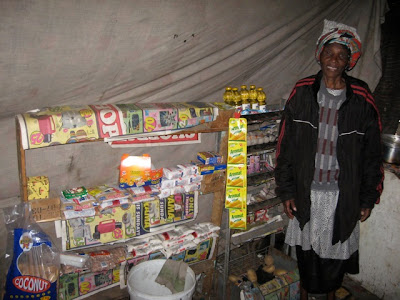Inside a spaza shop
One of the first things I did this week was check on the progress of the nine women we lent money to in August in the first round of loans of our new micro-credit program. First, the good news: all nine have begun to repay the money. The not-so-good news is that not all of them have stuck to the consistent repayment schedule that we worked out with each person individually. Some have missed a few payments and so are already behind. But at least they’ve proven they understand the idea of repayment; now it is a matter of making those more consistent.
I’ve haven’t spoken with all our borrowers yet but I did have a few good encounters on Thursday when I made the rounds to the few women who have started spaza shops, what we might call a convenience store in North America.
This is a Nobathembu and she is standing in front of the wares she has been selling for the last month and a half. You can see in the picture eggs, candles, matches, sugar, vegetables, cooking oil, cookies, juice mix, beans, and more for sale. And she’s selling all that out of this house.
And she’s selling all that out of this house. So far, she is one of our star borrowers and has made every repayment on time. The initial loan was R1500 (a little less than $200) and she is repaying R50 (about $7) per week.
So far, she is one of our star borrowers and has made every repayment on time. The initial loan was R1500 (a little less than $200) and she is repaying R50 (about $7) per week.
You might remember Nobathembu from a story I told a few months ago about how she was pretty sick. I was uncertain about how much to let that knowledge influence the decision about the loan. Ultimately, as she was looking stronger and her condition seemed to be improving, her health didn’t seem like a major issue. But she has not been doing well lately and she looked markedly worse when I saw her on Thursday than I remember her. It’s a reminder of something I told people frequently last month, that development issues like health, education, development are all deeply inter-related.


0 comments:
Post a Comment